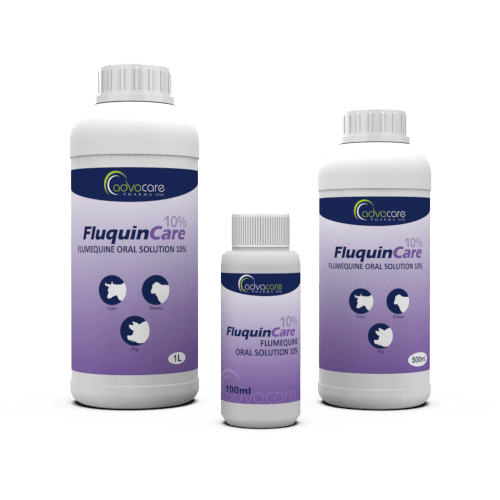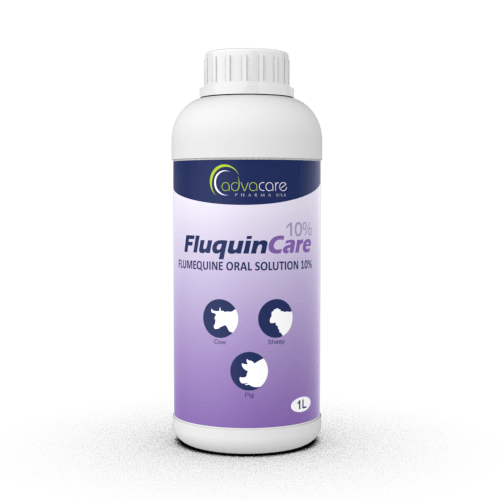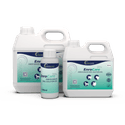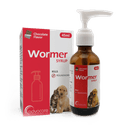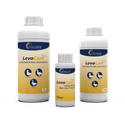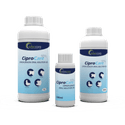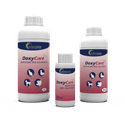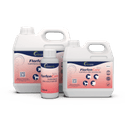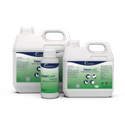- Home›
- Veterinary Pharmaceuticals›
- Veterinary Solutions and Suspensions›
- Veterinary Oral Solutions›
- Flumequine Oral Solution
Flumequine Oral Solution
Dosage
Packaging
What is Flumequine?
Active Ingredients: Flumequine
Flumequine Oral Solution is an antibiotic drug used to treat infections in poultry and livestock animals like cows, goats, sheep, and pigs. It is indicated for the treatment of a wide range of gastrointestinal illnesses, including colibacillosis, enteritis gastroenteritis, and swine dysentery.
Flumequine belongs to the group of drugs called quinolone antibiotics. It shows bactericidal action against Haemophilus, Campylobacter, Pasteurella, E. coli, and Salmonella.
This is a synthetic antimicrobial agent derived from quinolone carboxylic acid. It is used for controlling intestinal infections in production animals. The quinolones have amphoteric properties and generally display low water solubility within the pH range of 6–8. The impact on therapeutic efficacy is not well understood, but they function as weak bases, being less effective in acidic urine pH compared to non acidic conditions. In concentrated acidic urine, some quinolones may form needle-shaped crystals. Quinolones intended for oral or parenteral administration typically include freely soluble salts in stable aqueous solutions. The most common way of administering this drug is oral. The bioavailability is higher than 80%, and in cattle is from 0-20%. If the animals have eaten before administering this drug, it can impact its efficacy.
Regarding distribution, this drug penetrates all tissues well due to the high lipid solubility. Tissue concentrations are always higher than plasma concentrations. There are also high concentrations in organs responsible for elimination, like kidneys, liver, and bile. This drug can also be found in prostatic fluid, bone, ocular fluid, endometrium, and CSF. Fluoroquinolones cross the placental barrier.
This drug is eliminated unchanged or partially metabolized. It is mostly eliminated through the kidneys by glomerular or tubular secretion. The concentration in urine is high after 24 hours of the last administration.
The activity of this medication is through DNA gyrase that inhibits supercoiling of DNA and it is important to note that this drug is concentration-dependent. Only once-per-day treatment is enough for this drug.
It is important to note that Flumequine Oral Solution is for veterinary purposes only.
AdvaCare Pharma is a trusted global producer and exporter of Flumequine Oral Solution. This veterinary medication is manufactured in our GMP-certified facilities in China, India, and the USA. We routinely inspect these facilities to ensure our products meet health, safety, and environmental standards.
Why are we a quality Flumequine manufacturer?
AdvaCare Pharma, an American company, is a quality manufacturer of Flumequine Oral Solution for veterinary use. We are committed to the manufacture and global distribution of over 250 GMP-certified veterinary medicines, including 70+ oral liquid formulations.
As a trusted Flumequine manufacturer, our approach to supply chain management is systematic and data-driven. We provide unparalleled support to our veterinary distributors, assisting with document and product registration, supply chain coordination and market share growth.
Uses
What animals can be treated with Flumequine Oral Solution?
This medicine is recommended for poultry, goats, cows, sheep, and pigs.
How is Flumequine Oral Solution used?
This medicine has been manufactured as a solution, which is intended to be diluted and administered orally. It is typically added to drinking water.
How can Flumequine Oral Solution help in genito-urinary infections?
Pyelonephritis is a common disease in animals. These animals have renal insufficiency and bacteriuria, fever, and leukocytosis. This antibiotic is effective in reducing the signs of genitourinary infections by excellent tissue penetration. To determine whether this antibiotic is the right choice, perform a culture susceptibility test of the urine. Do not start treating the animal before the results of the urine culture are done because in some cases, other antibiotics are needed. The treatment of pyelonephritis may last for 4-6 weeks, or from 10-14 days if the disease is easily controlled.
This antibiotic penetrates into the prostatic fluid and can be a good drug of choice for treating prostatitis caused by bacteria.
How can Flumequine Oral Solution help in respiratory infections?
This drug shows good results against gram-positive and anaerobic bacteria in the respiratory tract. It can reduce the symptoms of nasal discharge, fever, and difficulty breathing.
The treatment should last from 4-6 weeks.
Flumequine can also help in the treatment of pyothorax. For a successful treatment, the septic exudate should be removed from the chest, and then the antibiotic can be effective. After 10-14 days the veterinarian should decide about further treatment.
Fluoroquinolones can be effective in treating feline infectious anemia, according to a study. It is also useful in treating rapidly growing mycobacterial infections.
High concentrations of this drug might lead to a fast recovery because the bacterial resistance mechanisms can overwhelm. However, high dosages might lead to antibiotic resistance. Farmers should always follow the veterinarian's advice.
How can Flumequine Oral Solution help in gastrointestinal illnesses?
This antibiotic is effective against many bacteria that lead to gastrointestinal consequences. It can be effective in treating symptoms of diarrhea, constipation, and vomiting. It can also improve the blood tests results when a certain disease is present. It is often combined with other antibiotics and supplements that can improve the symptoms of gastrointestinal problems. Probiotics and this antibiotic can give good results in the treatment process.
Is only Flumequine Oral Solution enough for treating diseases?
It depends on the urine culture results. Very often, this drug is a first-choice drug and gives good results. However, sometimes it should be combined with other antibiotics and supplements to get the desired results.
How should Flumequine Oral Solution be stored?
This medication should be stored in a dark, dry location under 30°C. Keep the bottle tightly sealed when not in use.
Is there a withdrawal period after treatment with Flumequine?
The withdrawal time for eggs is 30 days. For meat or offal, the withdrawal period is 2 days. The exact duration will depend on local regulations. The time of withdrawal depends on the country’s regulatory requirements. It must be followed to prevent food residues and consequent public health implications.
Dosage
How much Flumequine Oral Solution should be given to poultry?
The usual dose is 12-18mg/kg.
How much Flumequine Oral Solution should be given to pigs?
The usual dose is 12-15mg/kg. The duration of treatment is 3-5 days.
The dosage depends on the animal’s species, weight, age, and other individual characteristics. It also depends on the animal's current health condition.
Refer to a veterinary doctor or pharmacist for guidelines on dosage.
Side Effects
As with all pharmaceuticals, some unwanted effects can occur from the use of Flumequine Oral Solution.
There have not been any significant adverse effects recorded for short-term usage of Flumequine. Serious side effects may include allergy or hypersensitivity reactions. Side effects also include vomiting, diarrhea, and potentially fatal antimicrobial-induced colitis.
Cats may experience acute retinal degeneration. They also show concentration-dependent risks, particularly in the presence of renal disease.
Quinolones tend to be neurotoxic, and high doses can lead to convulsions due to GABA receptor antagonism.
Large doses of quinolones during pregnancy may result in embryonic loss and maternal toxicity. Excessive use of quinolones should be avoided in immature animals due to the risk of cartilaginous erosions and permanent lameness.
For a comprehensive list of all possible side effects of this medication, consult a veterinarian.
Precautions
Do NOT use Flumequine Oral Solution for an animal that:
- has a known allergy or hypersensitivity to any of the ingredients.
- is a hen laying eggs for human consumption.
Food can decrease the efficiency of this drug in monogastric animals. Antacids with magnesium and calcium can decrease the bioavailability via chelation.
Animals with kidney failure should receive lower doses because the drug’s main way of elimination is through urine.
Gloves should be worn while handling this product. This product can also lead to eye and skin irritation when handled. If the product comes into contact with your eyes or skin, wash them immediately.
Keep this product out of reach of children and animals.
What are the most common animals for which Flumequine Oral Solution is used?
Flumequine Oral Solution is primarily employed for the treatment of bacterial infections in companion animals, poultry, and livestock. The specific common uses of Flumequine Oral Solution include the treatment against the following bacteria:
- E. coli
- Salmonella
- Klebsiella
- Enterobacter
- Proteus
- P. aeruginosa
- Brucella spp
- Rickettsia
- Chlamydia
- Mycoplasma
- Streptococcus spp
- Enterococcus faecium
- Enterococcus faecalis
Poultry Bacterial Infections
Flumequine is utilized in the treatment of severe bacterial infections in poultry. It plays a role in managing Mycoplasma infections caused by susceptible bacteria in the respiratory tract. Additionally, flumequine can effectively address Salmonella and Mycoplasma. Flumequine has demonstrated effectiveness against various enteric infections in poultry.
Companion Animals Bacterial Infections
This antibiotic is most commonly used for treating gastrointestinal infections in animals. It is also a first-choice antibiotic in cases of respiratory infections in animals. Also, it is used for treating prostatitis and pyelonephritis.
Swine Bacterial Infections
This antibiotic can be used for treating serious respiratory, gastrointestinal, or urinary infections in swine. It also shows good results in treating pyelonephritic and pyothorax in swine.
Ruminants Bacterial Infections
This drug can be used for treating prostatitis and pyelonephritis. It is also effective against many respiratory and gastrointestinal tract infections.
This antibiotic might lead to a resistance, but a combination of this antibiotic and other drugs can enhance the spectrum and efficacy against many gram-negative and gram-positive bacteria. The veterinarians should decide whether this combination is needed according to the current health status of the animal and the antibiogram results.

You might be interested in...
Why AdvaCare Pharma?
As an industry leader, we are aware of our responsibility to provide affordable and sustainable solutions to improve healthcare worldwide.
